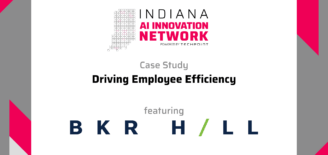CloudOne on inventing the IBM Software cloud: from startup to world leader in less than four years
It’s not every day you get the chance to invent your own marketplace with built-in potential customers like Xerox, McDonald’s, the U.S. Army, Deloitte, John F. Kennedy Airport, and Panasonic to name a few. But wouldn’t you jump at that chance if you had the idea to bring a more flexible and dynamic delivery model to one of the world’s most respected brands?
 That’s exactly what 20-year IBM Software Group veteran John McDonald did when he formed CloudOne and became the world’s first company to offer Software-as-a-Service (SaaS) and Virtual Private Cloud delivery of IBM Software products.
That’s exactly what 20-year IBM Software Group veteran John McDonald did when he formed CloudOne and became the world’s first company to offer Software-as-a-Service (SaaS) and Virtual Private Cloud delivery of IBM Software products.
In the four years since angel investors provided initial funding — most of them from Indiana and many of them Indianapolis Colts players — CloudOne has doubled its revenue every year.
Following a series A round of investment from HKS Capital Advisors of Chicago, a group formed around two large angels; and a series B round led by Elevate Ventures, an extension of the Indiana Economic Development Corporation; CloudOne is currently deploying resources from its series C round (completed in December) led by Bootstrap Venture Fund of San Diego, Calif., with significant investment from principles involved in the sale of Westfield, Ind.-based MaxIT Healthcare.
“We are focusing the resources of our C round heavily on sales and marketing, in order to grow our install base,” said John McDonald, CEO and chairman. “We will use proceeds from those sales to fill in our technical ranks for delivery of our cloud environments as well as operations talent new hires to support the growing company. We fully intend on keeping the trend going and again double our revenue this year.”
CloudOne’s core business is creating Virtual Private Clouds for customers and migrating their IBM software to the cloud so it’s safe and secure and instantly available anywhere in the world. The Virtual Private Cloud product is the company’s unique selling proposition; it should be, they invented it for IBM Software.
However, two other CloudOne services address specific pain points for customers — Managed Services Operations and Flexible Licensing.
Whether clients buy, rent or own the software, (it’s usually all of the above) CloudOne’s Managed Services team handles everything, keeping all software updated, available and operating fast. CloudOne integrates with existing help desks, applies patches, handles upgrades and troubleshooting, and operates as a one-stop-shop for all users. The company describes it as “like having your own on-demand operations experts.”
Buying software up-front, guessing about future needs and paying every year for maintenance are common challenges for enterprises of all sizes. CloudOne pioneered Flexible Licensing, which is SaaS licensing for IBM Software, that created a model where customers pay-as-you-go for licenses needed along the way. It’s ideal for fast and easy ramp-up with no long-term commitment, and helps customers manage the occasional peaks when extra users or capacity are needed for a short time.
CloudOne also pioneered the dynamic mixing of software licenses customers already own with those they “rent” on demand, creating a best-fit model that eliminates “shelfware” and enables growth at the customers’ pace. There are also major budget implications for customers who can scale up or down as necessary because they only pay for the software they use.
Overcoming Barriers to Market
 Two years ago, Forbes reported on a study that showed U.S. and European companies were trailing the rest of the world in cloud computing adoption, and by significant margins. The U.S. and Europe had less than one fifth (19%) and one tenth (12%) respectively of software applications hosted in clouds. Whereas the average large company in Latin America had almost two fifths (39%) of its total applications in the cloud, and Asia Pacific followed closely behind with over a quarter (28%).
Two years ago, Forbes reported on a study that showed U.S. and European companies were trailing the rest of the world in cloud computing adoption, and by significant margins. The U.S. and Europe had less than one fifth (19%) and one tenth (12%) respectively of software applications hosted in clouds. Whereas the average large company in Latin America had almost two fifths (39%) of its total applications in the cloud, and Asia Pacific followed closely behind with over a quarter (28%).
According to CloudOne founder McDonald, his company is seeing a much greater acceptance of cloud technologies, even by larger, often more cautious, and thereby slower enterprises. He said everything about business has become on-demand, from utilities and facilities to software and staffing, and that CloudOne is capitalizing upon the increase in cloud technology adoption by helping customers across all industries move to dynamic IT.
“One of the headwinds we have had in the U.S. is the substantial amount of investment made in large, private datacenter operations over the last decade,” McDonald said. “It’s difficult for organizations who have these large installations, as well as the attendant budgetary inertia they drive, to reconcile that there might be alternative sources of data center capacity available at a lower cost and with increased flexibility. In other parts of the world where these existing wells of infrastructure had not yet fully developed, it’s easier to now move to on-demand infrastructure sourcing.”
Studies today, like the Enterprise Cloud Adoption survey being presented at the Cloud Connect Summit in Las Vegas next week, show that enterprises are investing significantly in clouds. An early executive summary of the survey reveals that security concerns are declining, the cloud is emerging as a strategic differentiator, and perhaps most importantly for CloudOne, meaningful external help is needed by enterprises to adopt the cloud.
Getting a glimpse into the market potential for IBM Software private clouds and recognizing the achievement of a startup doubling revenue (at least) every year for four years, a question began emerging: How did an Indianapolis startup beat the rest of the world to this business model?
“I would say there are two reasons we were able to invent the Virtual Private Cloud for IBM Software and get to where we are today as the world leader,” McDonald said. “Number one, we have some very experienced IBM veterans who understood well what the marketplace was asking for and what IBM itself wasn’t delivering, and number two, we have a supportive, strong community of creative (and wealthy) people in Indiana willing to back a good idea.”
Raising the profile of Indiana startup companies through stories like this is made possible by Tailwind, a TechPoint initiative powered by the Indiana Office of Small Business and Entrepreneurship.


